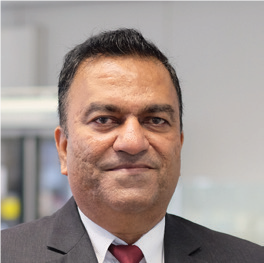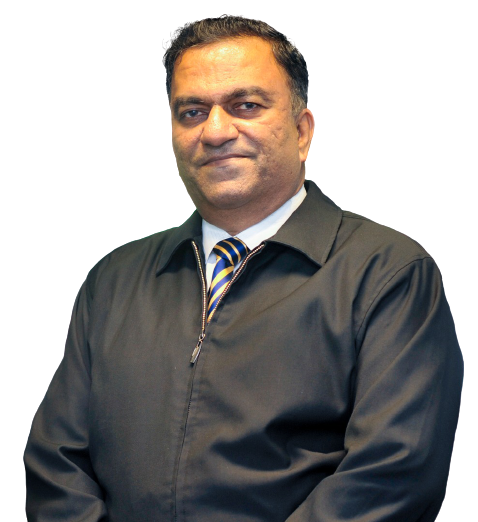 AP. Dr. Eswaran Padmanabhan obtained his first degree in Geology, which ultimately gave him a background about the earth's processes. It was during this time that an interest in tin mining surfaced – where it then became a dream of his to pursue a career with the Pahang Consolidated Company Limited (PCCL). He then moved on to a postgraduate degree in Mineralogy, specifically in Geochemistry.
AP. Dr. Eswaran Padmanabhan obtained his first degree in Geology, which ultimately gave him a background about the earth's processes. It was during this time that an interest in tin mining surfaced – where it then became a dream of his to pursue a career with the Pahang Consolidated Company Limited (PCCL). He then moved on to a postgraduate degree in Mineralogy, specifically in Geochemistry.
When asked how and where his interest in the PCCL stemmed from, Dr. Eswaran described how he had tutors who would often share stories about the tin mining experience. That was what initially captivated him as at the time, there were not that many opportunities in oil and gas. Unfortunately, before his class could graduate, PCCL had closed down, and so with that gone were all his dreams to work there.
He then shares, “Today I sit as the Institute Director of Hydrocarbon Recovery, primarily because of my knowledge in these processes which is essential in the recovery of oil or any form of hydrocarbon as well as pollutants and contaminants. Everything requires a solid liquid or gas interaction - that's my expertise."
Dr. Eswaran talks about how he has acquired a wide experience in diversified fields – mainly working with natural waters, sediments, mining areas, contaminants, electronic sludge, soils, rocks and minerals, and even EIA - air and water quality.
He mentions how, “A PhD was the qualification to let people know that you can approach a problem systematically – and dissect the problem intelligently."
He then goes on to describe how the different exposures he's had with these different industries has allowed him to develop a wealth of experience – all of which he is now able to translate into teaching and research, as well as other aspects of his life.
He states: “This is what I would like to tell the younger generation, besides the qualification, the function is your ability to be versatile and adaptive. I think I've been reasonably adaptive, not straying too far from my qualifications."
 Having completed his PhD in Canada, Dr. Eswaran was asked about some of his greatest research accomplishments. He recalls the beginning of his PhD journey, and how he ended up becoming a co-author for a chapter in a published journal.
Having completed his PhD in Canada, Dr. Eswaran was asked about some of his greatest research accomplishments. He recalls the beginning of his PhD journey, and how he ended up becoming a co-author for a chapter in a published journal.
“Prior to this, I found myself editing 14 journals on a topic that I had never heard in my life. I politely declined at first, to which I was responded with - 'well, you are in a learned society, and I don't expect you to say no'."
He mentions how he took up the challenge with only one book available on that said topic – the surface of minerals. As part of his PhD training, Dr. Eswaran was to provide feedback to his superior based on his reading and reviewing of academic journals. The intricacy of his work was what led him to become a co-author.
“The epitome of all this was, I had a sand sample from Brazil and I was looking at it through my binoculars microscope, and I thought I spotted a shiny egg-like material. I walked up to my Professor and said, 'I found dinosaur eggs in my sample.' These particles were the ion nodules."
He continues: “My professor asked me to explain more on the internal structure of these nodules. It reached a point where I said, 'That's it, I can't tell you more'. He reached out to pull out a paper that he had just published three months ago. I was asked to do the same with my 'dinosaur eggs', and so I did. It went on to become a landmark paper, the first of its kind in top journals."
His personal advancements allowed transformative changes to someone who was eager to taste what was unknown, to somebody who was a pace setter. He claims it was a cultural and technological shock – coming from the estate to being in freezing -75F Canada.
“The most important thing however, is the transformation of the mind. As I said, a guy who came from the rubber estate to be transformed to a certain type of superior and creative thought process, you start to generate new ideas."
Regarding the transformation of the mind, Dr. Eswaran describes how he instils and inculcates this way of thinking amongst his own students. He explains that the end result corresponds to how you are expected to perform.
“The formula is quite simple. It's how you interact with them. The higher the level the student is, the more different the approach has to be. You have to encourage them to think beyond."
He continues: “My master's supervisor was a walking Wikipedia for Mineralogy. He actually took the borders out of my life. The only person stopping you from achieving something is your own self. He took away all the boundaries so I could reach greater heights."
Dr. Eswaran claims that the idea is once you have the mind-set which enables you to keep thinking differently - you tend to look at things differently. When you look at things differently, you're now open to more innovative ideas.
He then adds: “The key is your personal degree of adaptability. Are you versatile enough to adapt to a new environment? If so, you are then able to receive more."
When one thinks about entering a new phase of their life, things could indeed get overwhelming, especially when all the obstacles are laid out on the table. Dr. Eswaran comments on this idea through the notion that there will be many other forces stopping you, once you enter the real world. It could be the lack of funds or perhaps incompetent equipment to cater for fundamental research. It's about taking something and powering through creatively and efficiently.
He elaborates by saying, “I think that we, as a society, should move in that direction. Being creative with what we already have. Fear is another thing that will stop many people. If you have enough experience being with people who think differently, it could put you in a position to do something bold."
He then carries on to provide a suggestion, “Overcome that fear. Never let anybody tell you that you cannot do this or that. You only have this one life, so go and live it."
Additionally: “I may not be an advocate for taking risks, but I'll never stop facing challenges. Sometimes I'll lose, and sometimes I'll win. When I lose, I just have to think to myself like Sylvester Stallone in the film Rocky."
“It's not how many times you fall, but it's how many times you pick yourself up. Life is full of challenges; you just have keep getting out of it. You learn from your experiences. Cut your losses, and count your blessings."
The interview came to a conclusion when Dr. Eswaran was asked about a potential life memoir – if he were to have one. “I could be candid about it - Life and Times of an Estate Boy! Perhaps even Epitome of Success. I look at my life proudly - there's no secret to it, especially during my student years."
“I practically only had a meal a day, which was dinner. Every other meal was simply tap water. I had European clothes for a Canadian winter. There were many times where I felt like quitting – what is the purpose of everything? But this was my lifelong mission to earn a PhD. This kept the fire burning with the desire to succeed."
“I always had the perseverance and the desire to become somebody. I'm very grateful to PETRONAS for giving me an opportunity. The few things that I always hold on to are tolerance, perseverance and persistence."
Dr. Eswaran takes the reader back to the early days of his life, where he talks about how he may not have led the easiest life – but he enjoyed every moment of it nonetheless.
“If I had any chance to go back in time to where I first started – if somebody had offered me an 'Option B' to do something different – I still wouldn't have it any other way. I have no regrets."

